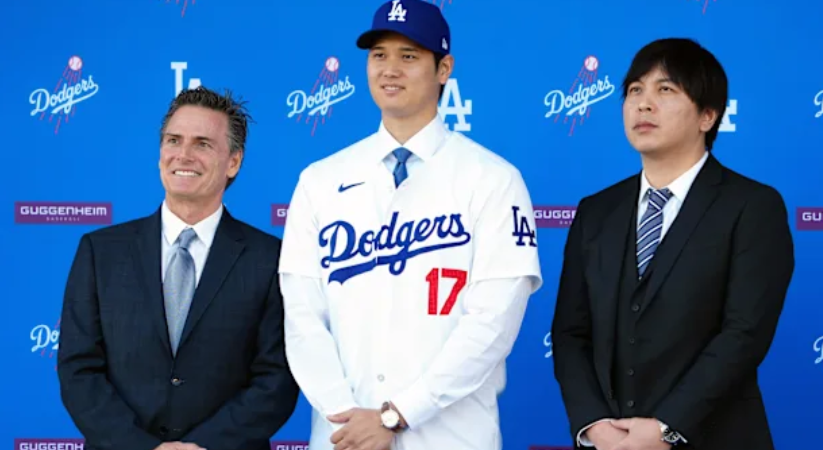
Ohtani’s Ex-Interpreter Gets Nearly Five Years for Fraud
In a scandal that’s rippled through both the sports world and the ever-underestimated realm of sports memorabilia, former interpreter and confidant to Major League Baseball icon Shohei Ohtani, Ippei Mizuhara, has found himself trading his translating headphones for prison shackles. Mizuhara, whose once-familiar presence was synonymous with Ohtani’s MLB journey, now claims an infamy in fraud, sentenced to 57 months in a federal penitentiary following a guilty plea addressing his gargantuan financial betrayal and illicit gambling escapades.
Rewind to the gilded veneer of March 2024, and the narrative was one of surprise as it unfurled amidst the usual humdrum of preseason baseball chatter. It was ESPN—sometimes the harbinger of less-than-pleasant sporting revelations—that first blew the lid off the can of worms detailing Mizuhara’s discreet battle with both immense temptation and digital legerdemain. His subsequent expulsion from the Los Angeles Dodgers organization was swift, and federal sleuths wasted no time in descending upon his dubious financial dealings like baseball fans clamoring for autographs at a spring training session.
In the courtroom showdowns that followed, the script unfurled with all the drama of a well-pitched duel. Mizuhara, whose digital sleight-of-hand had swindled a jaw-dropping $17 million, admitted to an artful but illegal mashup of financial manipulations. With audacious cunning, he altered banking security protocols to hijack Ohtani’s personal accounts, impersonated the very MVP he was meant to support, and like a Sorcerer’s Apprentice on a spree of financial tomfoolery, authorized unauthorized wire transfers with zest. The fruits of his misdeeds served not just to cover his runaway gambling debts but also to bankroll a thrifty pursuit of sports cards, which it seems he hoped would uphold the enduring motto: buy low, sell high.
These misappropriated funds, in part, nestled into a trove of high-end sports cards—the glossy, iconic visages of Ohtani himself, as well as revered figures like Yogi Berra and Juan Soto, now bore an uncomfortable association with grand larceny. Proudly acquired through platforms like eBay and Whatnot, these cards were intended as fleeting investments in Mizuhara’s shaky financial landscape.
Yet as the gavel fell in the courtroom in late 2024, those memorabilia wouldn’t rest forever in the hands of a jailed conman. Ohtani, in a decisive return to the courts—this time of a judicial nature—laid his own claim for what was rightfully his. And just as he had often delivered for his team with both bat and ball in hand, his legal vindication was served when a federal judge ruled in favor of the MVP, reuniting him with the pilfered treasures.
Mizuhara’s sentencing was as much a cautionary tale as it was a chapter of closure. He’s slated not only for nearly half a decade behind bars but is shackled with restitution to the tune of $17 million owed to Ohtani, and another $1.1 million to placate the ever-watchful eyes of the IRS for his tax-dodging endeavors. If life as a baseball interpreter once boasted excitement and adventure, Mizuhara’s new calling involved enduring a rather less glamorous demersal phase of the American justice system, possibly punctuated by deportation proceedings post-release.
The whirlwind fallout of Mizuhara’s scandal didn’t just tarnish his reputation but also cast a lingering shadow over the MLB community at large. The uproar not only catapulted conversations about safeguarding financial transactions for athletes—but also underscored the vulnerabilities woven into the fabric of sporting fame, where the line between trusted friend and fraudulent predator can easily blur under bright stadium lights.
Ohtani has responded with the class and restraint that echoes a lifetime of honed professionalism, steering clear of public deep dives into the scandal’s waters. Yet the echoes of Mizuhara’s actions will likely resound throughout not only baseball but all sports that celebrate stardom, serving as a grim reminder of the temptations that lurk behind contracts and headlines.
The aftermath of Mizuhara’s downfall leaves the sports memorabilia industry twitching, the very notion of trust tweaked, and MLB fans reminded of the need for vigilant oversight. With Mizuhara set to pay for his dubious deeds, the saga stands as a testament to both the value of safeguarding one’s wealth and the delicate web of relationships all rolled seamlessly together in the fast-paced and occasionally unforgiving world of professional sports.